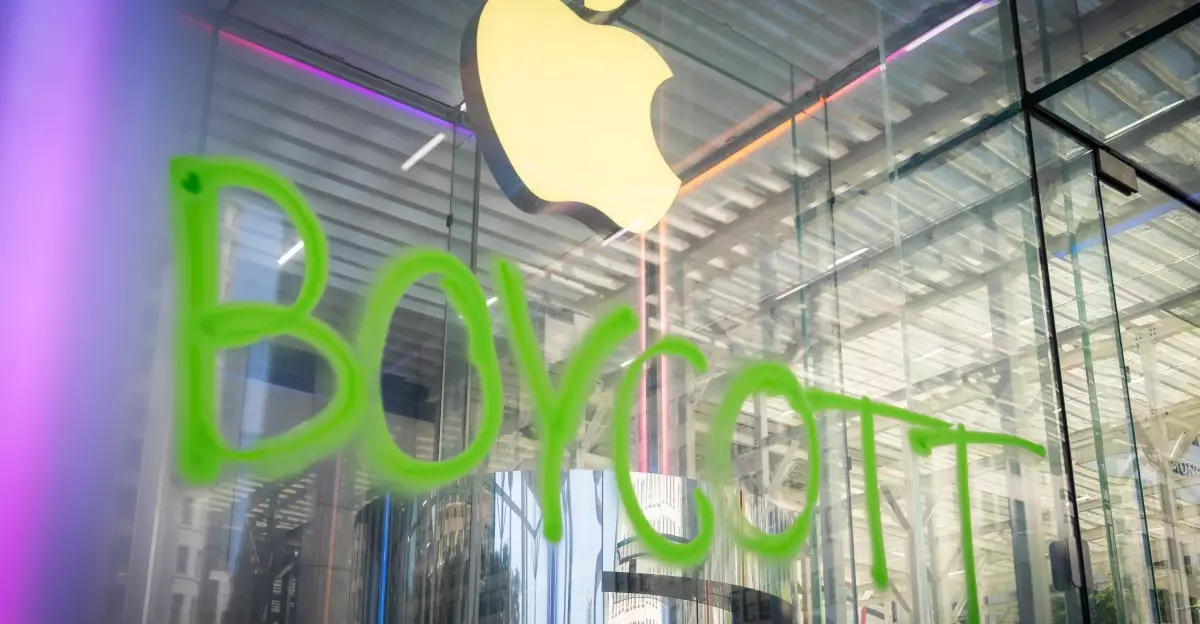In recent years, corporations have increasingly marketed themselves as champions of sustainable development and environmental consciousness. Tech titans like Apple, Google, and Microsoft boast about their initiatives to reduce carbon footprints and promote green energy. However, a closer examination reveals a stark disconnect between their claims and their actions. Protests such as those by Extinction Rebellion highlight a growing frustration with these companies’ superficial commitments, exposing their complicity in environmental degradation rather than genuine efforts toward sustainability. The demonstration at Apple’s Fifth Avenue storefront, marked by provocative spray-paint art and direct accusations, exemplifies this mounting disillusionment. These protests serve as a stark reminder that corporate sustainability is often a performative façade, intended more for brand image than substantive impact.
The Contradiction Between Corporate Rhetoric and Political Alliances
A critical issue at the heart of climate hypocrisy involves the political alliances these companies forge. Despite publicly endorsing climate agreements like the Paris Accord, many tech CEOs have maintained relationships with administrations hostile to environmental progress. The alliance between Apple’s Tim Cook and figures like Donald Trump exemplifies this troubling contradiction. While publicly advocating for sustainability, these executives lend credibility to regimes actively dismantling environmental protections. The protests’ focus on this contradiction underscores a critical question: to what extent can corporate climate commitments be genuine if they are intertwined with political figures dismissive of environmental science? Their support for policies that prioritize fossil fuels and weaken regulations undermines their claims of being environmentally responsible.
The Ethical Dilemmas of Greenwashing and Environmental Betrayal
There is an undeniable risk of greenwashing—the practice of making false claims about environmental efforts to maintain consumer favor. Large tech firms, under the guise of sustainability, continue practices that exacerbate climate change. For instance, Google’s increased emissions despite its green commitments illustrate how superficial efforts often fail to address root issues. The use of expansive data centers powering AI and digital infrastructure demands massive energy consumption, which often negates the supposed ecological benefits. Meanwhile, Microsoft’s escalating AI investments serve as a cautionary tale: technological advancements that promise progress may, in reality, deepen environmental harm if not managed responsibly. These issues reveal a pressing ethical dilemma—should consumers trust corporate narratives that prioritize innovation and growth while sidestepping environmental accountability? The protests point to the urgent need for transparency and integrity in corporate environmental responsibility.
The Power of Activism in Challenging Corporate Sleepwalking
The disruptive acts, from spray-painting slogans to vocal protests, highlight a crucial role that activism plays in holding corporations accountable. It’s not enough for tech giants to issue reassuring statements; they must face public scrutiny and pressure to enact tangible change. The Extinction Rebellion protest underscores this need for direct action, aiming to dismantle complacency surrounding corporate climate commitments. Such protests also serve as a call for consumers to demand more than just words—actions backed by verifiable results. The aggressive stance taken at the Apple store isn’t merely rebellious; it is a necessary wake-up call that exposes the hypocrisy and compels these corporations to reevaluate their true environmental impact. Without sustained activism, the false narrative of corporate climate leadership perpetuates, allowing greenwashed promises to continue masking environmental damage.
The Future of Corporate Accountability and Genuine Climate Action
As environmental crises accelerate, the imperative for authentic corporate responsibility becomes more urgent. The current landscape suggests that unless consumers and activists keep pressure on these companies, false promises will persist. Moving forward, a paradigm shift is necessary—one where transparency, measurable goals, and accountability are at the core of corporate ecological strategies. Activists must challenge not only policies but the very culture of corporate irresponsibility that incentivizes superficiality. Ultimately, the genuine transition to sustainable business practices hinges on holding large corporations accountable for their political and environmental decisions. If history serves as any guide, only relentless activism and informed consumer outrage can propel these giants toward authentic, impactful climate action.
*Note: This article is a critical reflection on recent protests and the broader implications of corporate climate hypocrisy, emphasizing the importance of discerning genuine commitment from superficial messaging.*

